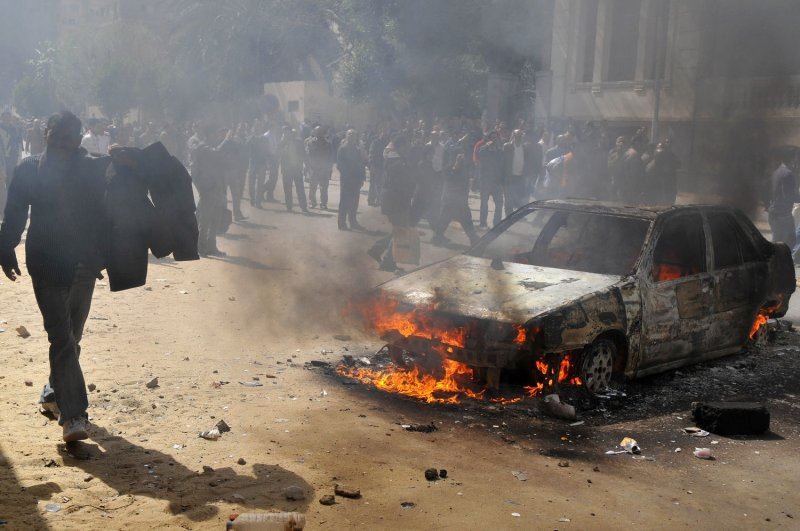A burning car is seen as Egyptian police officers protests in downtown Cairo, Egypt, February 23, 2011. UPI |
License Photo
CAIRO, Feb. 25 (UPI) -- As if the Middle East wasn't battered enough by political turmoil, analysts say the region is likely to be hit by rising food prices -- one of the problems that triggered the unrest.
The political tempest that has unseated two presidents and is expected to see the downfall of a third could well be fueled by the rising oil prices that it has engendered.
Oil prices have climbed past the level of $105 per barrel since the upheaval began in early January, particularly after violence erupted in Libya, a major oil producer, flared in earnest earlier this month. That's the highest in 2 1/2 years and is edging toward the peak level of $147 per barrel just before the global financial meltdown of 2008.
Modern agriculture is heavily dependent on fossil fuels, which are used for farm machinery and fertilizers. Add the effects of climate change and burgeoning populations and the problem just gets worse.
"Egypt nudged prices upward (due more to the importance of the Suez Canal to tanker traffic than its own oil output)," The Guardian newspaper of London observed.
"Libya, the world's 12th biggest oil exporter at 1.2 million barrels a day, adds momentum.
"If these countries stabilize, the impact may be limited. If the unrest spreads to bigger oil producers, such as Saudi Arabia or Iran, expect further spikes, not just of oil but of food."
Michael Klare, professor of Peace and World Security Studies at Hampshire College, warned in January, just as the riots in Tunisia and Egypt began, that food prices were climbing to dangerous levels.
"From now on, rising prices, powerful storms, severe droughts and floods and other unexpected events are likely to play havoc with the fabric of global society, producing chaos and political unrest," he wrote.
"The prices of basic food staples are already approaching or exceeding their 2008 peaks."
Klare has for years been warning that the planet is headed toward a period of multiple conflicts triggered by shrinking resources such as oil, water and minerals.
"It's not surprising then that food and energy experts are beginning to warn than 2011 could be the year of living dangerously -- and so could 2012, 2013 and on into the future …
"No one can predict where the next explosion will occur but with food prices still climbing and other economic pressures mounting, more upheavals appear inevitable.
"These may be the first resource revolts to catch our attention but they won't be the last."
The wealthy oil states of the Persian Gulf, led by Saudi Arabia and the United Arab Emirates, produce little food and with their population burgeoning they have been buying arable land across Africa and Asia to produce food for their people.
The World Bank estimates that that worldwide 115 million acres of land have been sold or leased to foreign investors, primarily in Africa, forcing out traditional subsistence farmers and smallholders.
But this land grab caused food shortages and mounting anger in those countries whose governments sold the vast tracts of farmland, Africa's last great resource, to foreigners for hefty profits.
Indeed, a coup in the Indian Ocean island of Madagascar, off East Africa, last August resulted from the sale of prime farmland. It also triggered food riots in impoverished Mozambique.
"Arab countries are very vulnerable to fluctuations in international commodity markets because they are heavily dependent on imported food," a report by the World Bank, the United Nations' Food and Agricultural Organization and the International Fund for Agricultural Development in late 2009 cautioned.
"Arab countries are the largest importers of cereal in the world. Most import at least 50 percent of the food calories they consume."
It added: "The potential decoupling of petroleum and food commodity prices may cause deterioration in the fiscal balances of oil-producing countries, reducing their ability to cope with future shocks.
"It is not known if world prices will be high or low but it is certain that Arab countries will remain vulnerable to food price and quantity shocks in the future …
"The structural factors driving food demand are increasing faster than worldwide. The combined population growth rate of all Arab countries is projected to be 1.7 percent. The world rate is 1.1 percent … No Arab country is protected from future food-price shocks."















